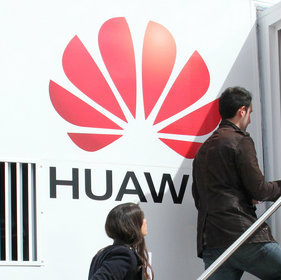Operators will not be allowed to buy 5G products beyond the end of this year and will have to remove Huawei's products by 2027.

The UK government has banned the country's telecom operators from buying any of Huawei's 5G equipment beyond the end of this year and issued a deadline of 2027 for the complete removal of Huawei's 5G products from their networks.
The widely anticipated move comes in response to a US campaign against the controversial Chinese vendor, which has recently included a tightening up of sanctions to prevent Huawei from buying semiconductors made with US equipment or design expertise.
Announcing the decision in the UK parliament today, Oliver Dowden, the Secretary of State for Culture, Media and Sport, said the sanctions would have a "severe impact on Huawei's ability to provide equipment in the UK" and had led the National Cyber Security Center to change its security assessment.
Under new laws, operators will have until the end of this year to cease purchasing any 5G equipment from Huawei and must remove all Huawei 5G products from their networks by the end of 2027.
Earlier restrictions had banned Huawei from the "core," the control center of the network, while limiting its presence to just 35% of any 5G radio access or fiber broadband network.
The government is still re-evaluating Huawei's role in full-fiber and older networks and has launched a technical consultation to determine the best approach, Dowden told the House of Commons.
An apparent concern is the lack of alternative vendors in the market for full-fiber networks.
Dowden was at pains to emphasize that today's decision was not taken lightly and is expected to hold up the UK's rollout of new-generation 5G services and lead to additional costs for UK operators.
"Today's decision to ban procurement from the end of this year will delay rollout by a year and add half a billion pounds to costs," he said. "Requiring operators to remove equipment by 2027 will add hundreds of millions to costs and further delay rollout."
The government is expecting a total delay of two to three years and a total 'rip-and-replace' bill of "up to £2 billion [US$2.5 billion]," said Dowden.
That is lower than estimates provided last week by executives from BT and Vodafone, who told a parliamentary committee that a total 5G ban on Huawei would cost at least £2.6 billion ($2.9 billion) and result in blackouts for customers if operators were not given at least five years to replace the Chinese firm.
While authorities have come up with a lower figure, they appear to have taken heed of the telco warnings about service disruption in the event of a hasty swap-out.
Authorities have not moved to exclude Huawei from the UK's 2G, 3G and 4G infrastructure, but service providers have previously said any 5G ban would also necessitate a 4G overhaul to prevent interoperability problems between kit from different vendors.
A Huawei spokesperson said the decision was "bad news for anyone in the UK with a mobile phone."
"It threatens to move Britain into the digital slow lane, push up bills and deepen the digital divide," he said in emailed comments. "Instead of 'leveling up' the government is leveling down and we urge them to reconsider. We remain confident that the new US restrictions would not have affected the resilience or security of the products we supply to the UK."
Brewster said Huawei's future in the UK had become "politicized" amid the trade war between the US and China.
Want to know more about 5G? Check out our dedicated 5G content channel here on Light Reading.
In the absence of many 5G alternatives, the ban is expected to drive operators toward Ericsson and Nokia, two Nordic firms that already supply mobile network products to BT and Vodafone.
Commenting on the Huawei ban, Arun Bansal, the head of Ericsson's business in Europe, said: "Today's decision removes the uncertainty that was slowing down investment decisions around the development of 5G in the UK."
"It is now time for the industry to come together and start delivering on the promise of creating a world-leading 5G network for the people, businesses and economy of the UK," said Bansal. "Ericsson has the technology, experience and supply chain capacity to help accomplish this, and we stand ready to work with the UK operators to meet their timetable, with no disruption to customers."
John Strand, the CEO of Danish advisory firm Strand Consult and an outspoken critic of Huawei, said there were "not many surprises" in today's decision and that it partly reflected recent concern about Chinese aggression.
"Today's China is not the China of five years ago; it has become aggressive and belligerent," he said in a research note. "While the rest of the world has grown more aware of human rights, China is increasingly intolerant. With its recent action in Hong Kong, China did the unthinkable from the UK perspective and has irrevocably changed the UK view on China."
Dowden said the policy move had been considered in the context of the UK's relationship with China.
"This government is clear eyed about China," he told the Commons. "We want a more modern and mature relationship with China and to work side by side with China on issues where interests converge. Today's decision is about securing the telecom network in light of new US sanctions."
US critics have long insisted that Huawei's products could feasibly include malware allowing Chinese authorities to spy on other countries or even bring down critical infrastructure – charges Huawei has repeatedly denied.
The UK government says the latest US sanctions have exacerbated the concerns because they could force Huawei to use components over which its own security watchdogs have less oversight.
Related posts:
— Iain Morris, International Editor, Light Reading
About the Author(s)
You May Also Like











